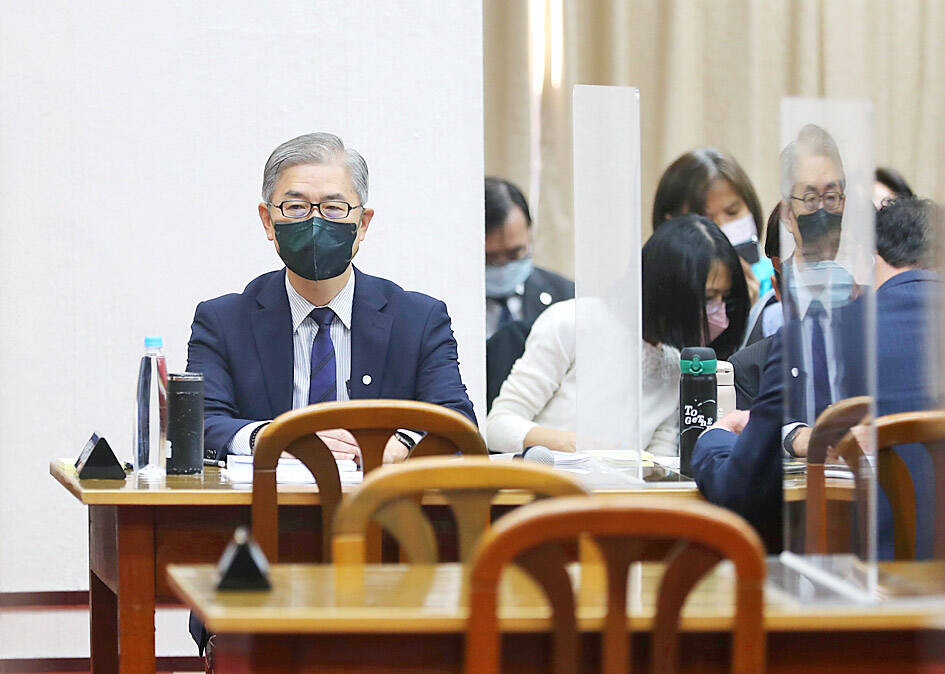Taiwan has no plans to implement a blanket ban on short-selling for the time being, but it would not rule out taking action in the future, Financial Supervisory Commission (FSC) Chairman Thomas Huang (黃天牧) told a meeting of the legislature’s Finance Committee yesterday.
A short-selling ban on stocks that fell 3.5 percent or more in the previous trading session took effect on Monday — unlike previous bans in 1998, 2008 and 2015, which applied to all stocks.
The commission considers factors such as global market movements, geopolitical tensions and inflationary pressure when making decisions on restricting short-selling, Huang said.

Photo: CNA
“Previously, the 2008 global financial crisis prompted the commission to ban short-selling of all stocks. However, we are facing a different situation this time,” he said.
“We still have other tools” to stabilize the local market, Huang said.
Despite solid fundamentals, Taiwanese equities have fluctuated in recent sessions, affected by central banks’ interest rate hikes, a global market rout, soaring inflation and Washington’s chip regulations, he said.
The latest short-selling ban applied to 152 local stocks on Monday and 93 stocks on Tuesday, including several large-cap stocks such as Taiwan Semiconductor Manufacturing Co (TSMC, 台積電) and MediaTek Inc (聯發科).
Yesterday, TSMC shares advanced 1.35 percent to NT$376 and MediaTek rose 2.84 percent to NT$579, Taiwan Stock Exchange data showed.
Foreign investors net sold Taiwanese shares for seven days in a row from Monday last week before buying a net NT$2.76 billion yesterday, Taiwan Stock Exchange data showed.

MULTIFACETED: A task force has analyzed possible scenarios and created responses to assist domestic industries in dealing with US tariffs, the economics minister said The Executive Yuan is tomorrow to announce countermeasures to US President Donald Trump’s planned reciprocal tariffs, although the details of the plan would not be made public until Monday next week, Minister of Economic Affairs J.W. Kuo (郭智輝) said yesterday. The Cabinet established an economic and trade task force in November last year to deal with US trade and tariff related issues, Kuo told reporters outside the legislature in Taipei. The task force has been analyzing and evaluating all kinds of scenarios to identify suitable responses and determine how best to assist domestic industries in managing the effects of Trump’s tariffs, he

TIGHT-LIPPED: UMC said it had no merger plans at the moment, after Nikkei Asia reported that the firm and GlobalFoundries were considering restarting merger talks United Microelectronics Corp (UMC, 聯電), the world’s No. 4 contract chipmaker, yesterday launched a new US$5 billion 12-inch chip factory in Singapore as part of its latest effort to diversify its manufacturing footprint amid growing geopolitical risks. The new factory, adjacent to UMC’s existing Singapore fab in the Pasir Res Wafer Fab Park, is scheduled to enter volume production next year, utilizing mature 22-nanometer and 28-nanometer process technologies, UMC said in a statement. The company plans to invest US$5 billion during the first phase of the new fab, which would have an installed capacity of 30,000 12-inch wafers per month, it said. The

Taiwan’s official purchasing managers’ index (PMI) last month rose 0.2 percentage points to 54.2, in a second consecutive month of expansion, thanks to front-loading demand intended to avoid potential US tariff hikes, the Chung-Hua Institution for Economic Research (CIER, 中華經濟研究院) said yesterday. While short-term demand appeared robust, uncertainties rose due to US President Donald Trump’s unpredictable trade policy, CIER president Lien Hsien-ming (連賢明) told a news conference in Taipei. Taiwan’s economy this year would be characterized by high-level fluctuations and the volatility would be wilder than most expect, Lien said Demand for electronics, particularly semiconductors, continues to benefit from US technology giants’ effort

‘SWASTICAR’: Tesla CEO Elon Musk’s close association with Donald Trump has prompted opponents to brand him a ‘Nazi’ and resulted in a dramatic drop in sales Demonstrators descended on Tesla Inc dealerships across the US, and in Europe and Canada on Saturday to protest company chief Elon Musk, who has amassed extraordinary power as a top adviser to US President Donald Trump. Waving signs with messages such as “Musk is stealing our money” and “Reclaim our country,” the protests largely took place peacefully following fiery episodes of vandalism on Tesla vehicles, dealerships and other facilities in recent weeks that US officials have denounced as terrorism. Hundreds rallied on Saturday outside the Tesla dealership in Manhattan. Some blasted Musk, the world’s richest man, while others demanded the shuttering of his